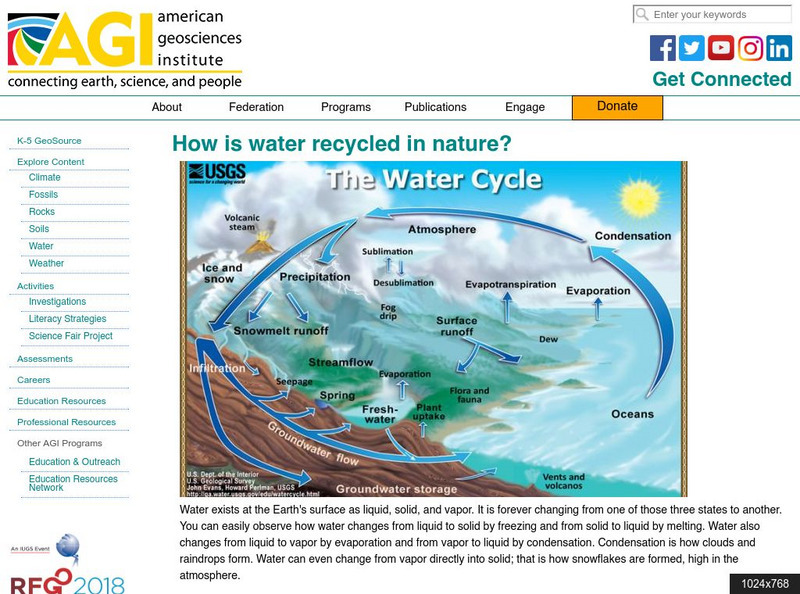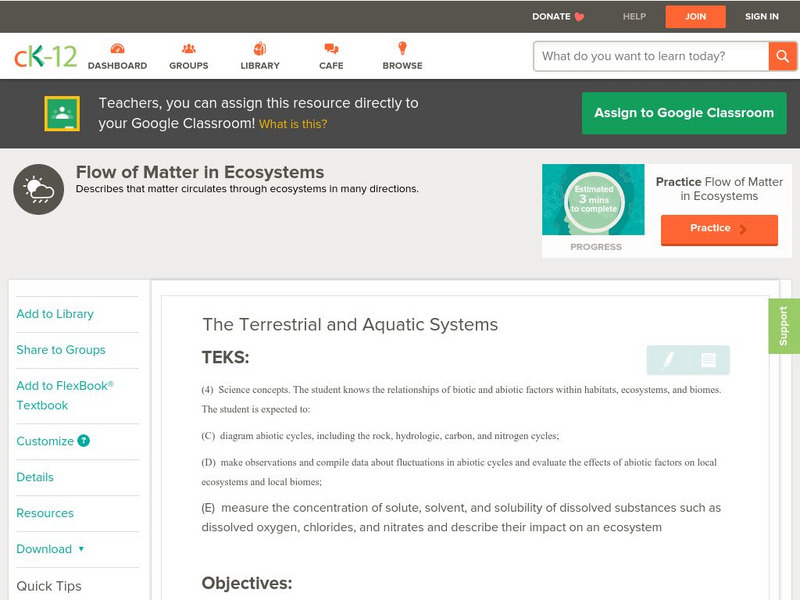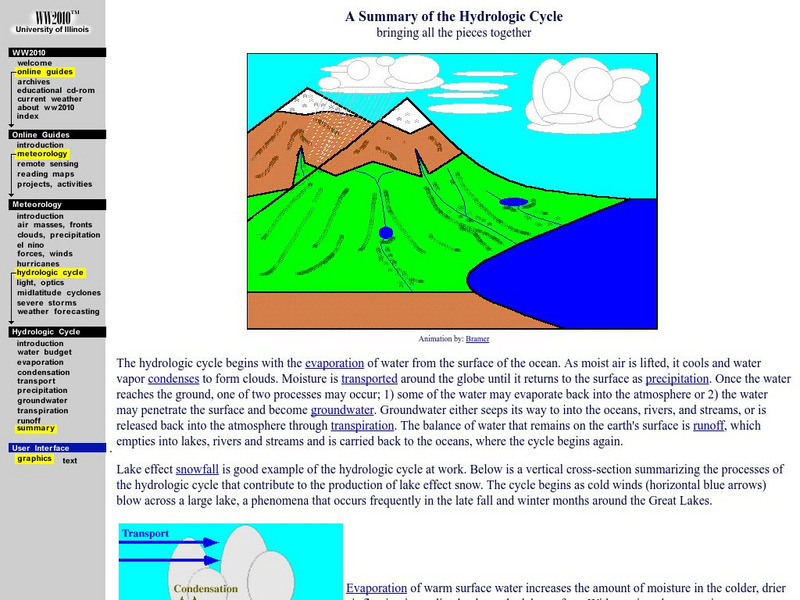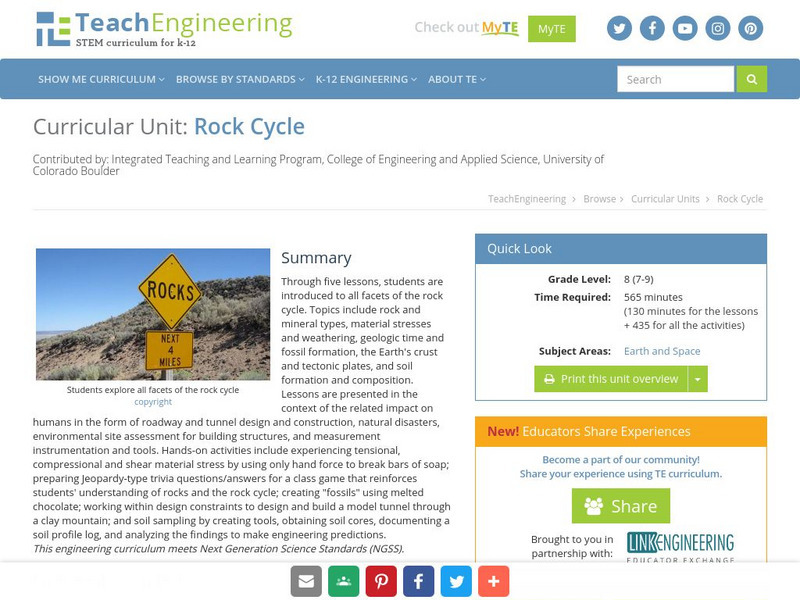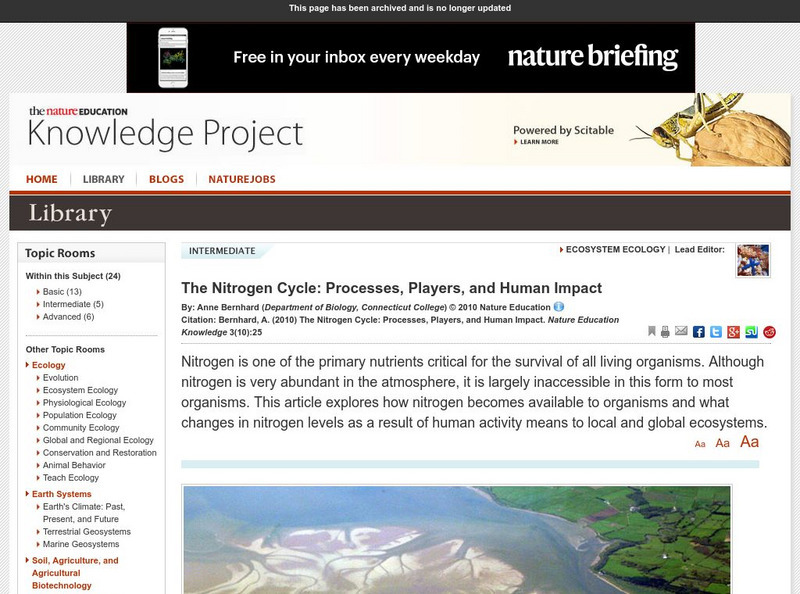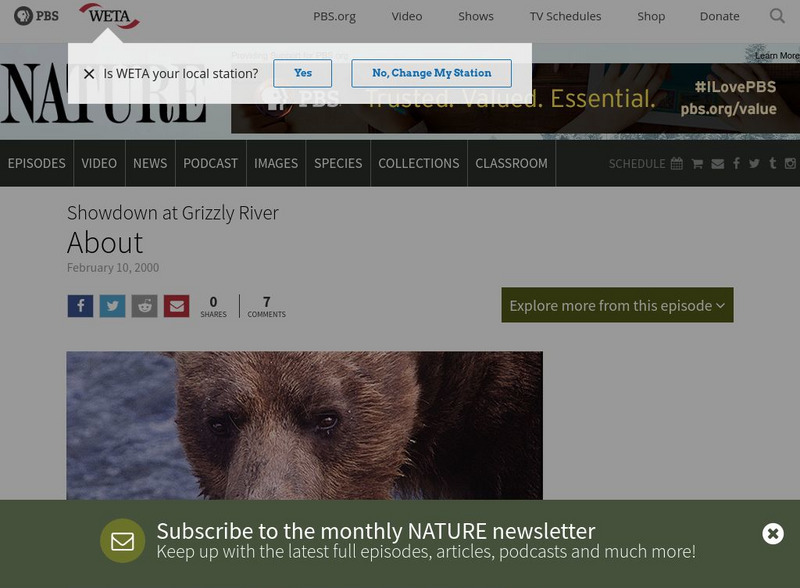Hi, what do you want to do?
Curated OER
Looking At Water: a Walking Field Trip
Fourth graders observe the effects of water on the soil and record those effect by drawing sketches of water erosion and conservation practices.
Curated OER
Tracking the Weather Using Technology
Fourth graders explore the use of technology to monitor and forecast weather. They investigate the different types of weather monitoring and forecast tools. Students interpret radar images and discuss the traditional types of weather...
Curated OER
Air Masses
Students examine the physical characteristics of several types of air masses to discover how air masses can be identified and defined by their temperature and moisture content.
Curated OER
Endangered Species- Florida Panther
Middle schoolers investigate the concept of the conservation of the Florida Panther and examine the effects of the Everglades water restoration project. They conduct a web based activity that includes the following: Listing what they...
American Geosciences Institute
American Geosciences Institute: How Is Water Recycled in Nature?
Learn about nature's most reliable geochemical cycle, the water cycle.
Other
American Chemistry Council: Plastics: Lifecycle of a Plastic Product
This site provides the background on the applications of the plastics industry. General in nature, but a good look at where plastic is in your life. Gives solid factual information.
TeachEngineering
Teach Engineering: Natural and Urban "Stormwater" Water Cycle Models
Students apply their understanding of the natural water cycle and the urban stormwater water cycle, as well as the processes involved in both cycles to hypothesize how the flow of water is affected by altering precipitation.
TeachEngineering
Teach Engineering: Natural and Urban Stormwater Water Cycles
Through an overview of the components of the hydrologic cycle and the important roles they play in the design of engineered systems, students' awareness of the world's limited fresh water resources is heightened. The lesson lays the...
Wisc-Online
Wisc Online: Earth Science: Water Cycle Bingo
Test your understanding of terms associated with the water cycle in this bingo- style game.
CK-12 Foundation
Ck 12: Earth Science: Flow of Matter in Ecosystems
[Free Registration/Login may be required to access all resource tools.] In this module, students will learn about the cycles of nature (water, carbon, nitrogen, and phosphorus) that support the flow of nutrient matter through an...
Other
Digital Library for Earth System Education: Teaching Box: Seasonal Upwelling
A suite of lessons focusing on the process of upwelling. Inquiry-based exploration of seasonal upwelling includes marine food webs, food production in the ocean, wind-driven ocean currents, and seasonal changes in biotic and abiotic...
University of Illinois
University of Illinois Urbana Champaign: A Summary of the Hydrologic Cycle
Animation and text explain the water--or hydrologic--cycle, which is the process that water undergoes in nature.
Ministry of Education, Sports & Culture (Samoa) Government
Mesc: Samoa School Net: Forces to Make Weather: Weather & Water Cycle
Explains three forces of nature and how they impact the weather. These include infrared rays from the sun, differences in air pressure, and wind flow when hot and cold air masses meet. Supported by lots of visuals.
TeachEngineering
Teach Engineering: Biorecycling: Using Nature to Make Resources From Waste
By studying key processes in the carbon cycle, such as photosynthesis, composting, and anaerobic digestion, students learn how nature and engineers biorecycle carbon.
TeachEngineering
Teach Engineering: Rock Cycle
Through five lessons, students are introduced to all facets of the rock cycle. Topics include rock and mineral types, material stresses and weathering, geologic time and fossil formation, the Earth's crust and tectonic plates, and soil...
Science Education Resource Center at Carleton College
Serc: Investigating the Water Cycle: Evaporation
In this water cycle activity, students investigate the evaporation process by participating in an outdoor evaporation experiment held on the school grounds. Students will determine where evaporation takes place the fastest and how nature...
TeachEngineering
Teach Engineering: Making & Breaking: The Rock Cycle
Middle schoolers learn the components of the rock cycle and how rocks can change over time under the influence of weathering, erosion, pressure and heat. They learn about geotechnical engineering and the role these engineers play in the...
Science Buddies
Science Buddies: Swimming in Acid: Understanding Ocean Acidification
The oceans are a precious natural resource, part of Earth's carbon cycle. But what happens if the oceans absorb too much carbon dioxide? Many scientists are concerned that the increased absorption of carbon dioxide is causing them to...
Nature Conservancy
The Nature Conservancy: Reforestation: Impact on Climate
Deforestation is clearing Earth's forests on a massive scale. In this lesson, students learn the value of large-scale forest landscapes and their role in the carbon cycle.
Nature Conservancy
The Nature Conservancy: Managing Salmon to Support Healthy Forests
In this lesson plan, students address the impact of unsustainable fishing practices.
Nature Research
Nature: The Nitrogen Cycle: Processes, Players, and Human Impact
Find out how nitrogen is cycled throughout the biosphere as it passes through the nitrogen cycle. Learn about the biotic and abiotic factors involved in the process as well as the implications of human activity on the nitrogen cycle.
Louisiana Department of Education
Louisiana Doe: Louisiana Believes: Social Studies: Grade 3: A Log's Life
Third graders learn about the interdependence of animals and trees in nature and the cycles of growth and decay. Students also learn about the importance of preserving balance in nature and what happens when we upset that balance. While...
PBS
Pbs: Nature: Showdown at Grizzly River
PBS Nature presents Grizzlies. Learn how grizzly bears raise their young around McNeil River Falls, a place in the wilderness of Alaska. This is a great place because of the salmon that swim up stream every summer.
Society for Science and the Public
Science News for Students: Nature Resets Body's Clock
Article reports on a recent study which found that people who spent a week in the woods experience a shift of two hours in their internal clocks. Includes a list of vocabulary words from the article.
Other popular searches
- Cycles in Nature Powerpoint
- Life Cycles in Nature
- Different Cycles in Nature
- Search Cycles in Nature
- Cycles in Nature Lab
- Cycles in Nature Maze









